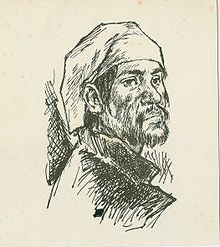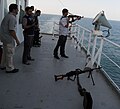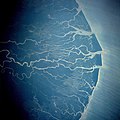Portal:Piracy
Introduction
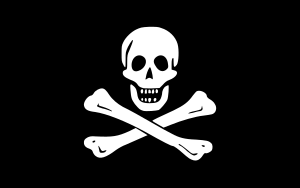
Piracy is an act of robbery or criminal violence by ship or boat-borne attackers upon another ship or a coastal area, typically with the goal of stealing cargo and other valuable goods. Those who conduct acts of piracy are called pirates, and vessels used for piracy are called pirate ships. The earliest documented instances of piracy were in the 14th century BC, when the Sea Peoples, a group of ocean raiders, attacked the ships of the Aegean and Mediterranean civilisations. Narrow channels which funnel shipping into predictable routes have long created opportunities for piracy, as well as for privateering and commerce raiding.
Historic examples of such areas include the waters of Gibraltar, the Strait of Malacca, Madagascar, the Gulf of Aden, and the English Channel, whose geographic structures facilitated pirate attacks. The term piracy generally refers to maritime piracy, although the term has been generalized to refer to acts committed on land, in the air, on computer networks, and (in science fiction) outer space. Piracy usually excludes crimes committed by the perpetrator on their own vessel (e.g. theft), as well as privateering, which implies authorization by a state government.
Piracy or pirating is the name of a specific crime under customary international law and also the name of a number of crimes under the municipal law of a number of states. In the 21st century, seaborne piracy against transport vessels remains a significant issue, with estimated worldwide losses of US$25 billion in 2023, increased from US$16 billion per year in 2004. (Full article...)
Selected biography -
D. Miguel Enríquez (c. 1674–1743), was a privateer from San Juan, Puerto Rico, Spain, who operated during the early 18th century. A mulato born out of wedlock, Enríquez was a shoemaker by occupation. After working for the governor as a salesman he was recruited to defend Puerto Rico, then a part of the Spanish Empire, and commanded a small fleet that intercepted foreign merchant ships and other vessels dedicated to contraband. These outlaws were thriving in the waters of the Caribbean Sea and the Atlantic Ocean, notably in the areas surrounding Saint Thomas, Curaçao and Jamaica. Operating during the height of the Golden Age of Piracy, his fleet was also credited with controlling the proliferation of buccaneers in the region. However, he was considered a pirate himself by the enemies of Spain, since it was common practice of the government to ignore when foreign ships were attacked. After some time operating independently, Enríquez received a letter of marque and reprisal from the Spanish Crown, this was a special permit granting him the privileges of a privateer. Corsairs from Puerto Rico were often called guardacostas, or "coast guards". They operated in the same fashion as any other pirate, the only difference was that they did it in the name of Spain, protecting imperial trade restrictions. Employing a systematic approach, Enríquez was able to become the most successful and influential Puerto Rican of his time. However, despite this, he was never able to gain the acceptance of the higher social classes, something that he strived to earn throughout his life.
During his years as a privateer, Enríquez established close links with the Spanish Monarchy. His ships were also responsible for the distribution of urgent messages that arrived at San Juan or La Aguada to the rest of the Spanish viceroyalties. When there was a shortage of royal vessels, Enríquez's fleet was responsible for transporting items on behalf of Spain without charge. His fleet also provided transportation for the authorities that arrived at Puerto Rico en route to other locations and for missionaries. Throughout the War of the Spanish Succession, Enríquez's ships were responsible for guarding the Antilles from British and Dutch incursions. Among the places where he established connections was the adjacent island of St. Thomas. Enríquez also dealt directly with the governor of Curaçao. At a time when letters of marque were being regularly issued in neighboring islands his actions converted San Juan into one of the most important ports in the Caribbean. Between 1702 and 1713 Enríquez owned a fleet of more than thirty vessels, losing at least a dozen and capturing more than twenty others. By the time that his career was over, he had reportedly commanded a fleet of over 300 privateer ships, of which approximately 150 were lost, employing close to 1,500 sailors. (Full article...)Selected article -
Did you know?
- ... that the developers of Hotline Miami 2: Wrong Number suggested that Australian customers pirate their game?
- ... that Saudi Arabian broadcaster beoutQ pirated and resold beIN Sports programmes during the Qatar diplomatic crisis?
- ... that HMS Redpole, one of the aptly-named coffin brigs, sank in an action with a pirate vessel in August 1828?
- ... that since 1904 the Gasparilla Pirate Festival in Tampa, Florida, has featured a pirate-themed parade?
- ... that indigenous Australian artist Daniel Boyd has depicted colonial figures including Captain James Cook and Governor Arthur Phillip as pirates?
- ... that in the Golden Age of Piracy, the word "pirate" was often spelled "pyrate" or "pyrat"?
- ... that red Jolly Roger flags were the most feared of all; all prayed they never encountered the "Bloody Red," which boldly declared that no mercy would be shown and all victims would be killed?
- ... that, while it is unknown if pirates actually kept parrots as pets, it is thought that at least some captains kept cats aboard to keep populations of rats and other vermin down?
Selected quotations
| “ | This man was a real-life Goliath; sadly, there was no David who could stand up against him! | ” |
| — unknown) | ||
General images
Selected Jolly Roger
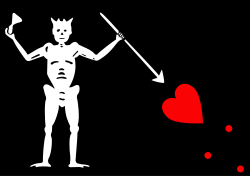
Subcategories
Topics
WikiProjects
Related portals
Things you can do

Contribute
- Work on piracy and pirate articles and help improve them to featured articles.
Expand
Join
WikiProject Piracy Requests
- eliminate red links from List of pirates
- expand Timeline of piracy, specifically to fill in vast gap between the 1890s to 2000s
- revise Bartholomew Roberts
- help with Requested articles and Expand articles
- help with Portal:Piracy
- Create Modern Piracy
Associated Wikimedia
The following Wikimedia Foundation sister projects provide more on this subject:
-
Commons
Free media repository -
Wikibooks
Free textbooks and manuals -
Wikidata
Free knowledge base -
Wikinews
Free-content news -
Wikiquote
Collection of quotations -
Wikisource
Free-content library -
Wikiversity
Free learning tools -
Wiktionary
Dictionary and thesaurus

